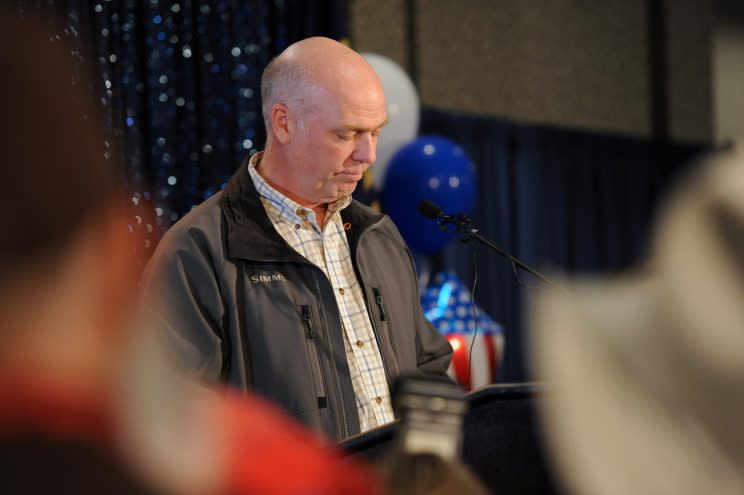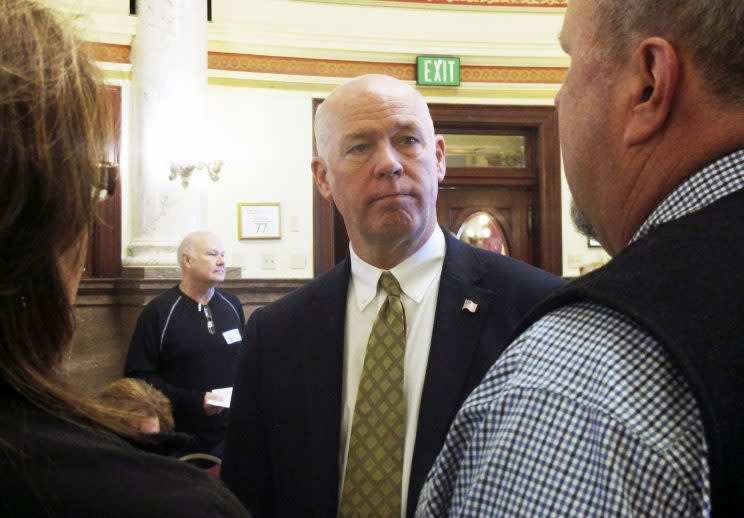Representative — and defendant — Greg Gianforte: How will it work?
Wealthy Montana Republican Greg Gianforte won his state’s only seat in the House of Representatives on Thursday despite facing a criminal charge for attacking a reporter a day earlier.
After his victory, Gianforte apologized to Guardian journalist Ben Jacobs by name and vowed to never embarrass fellow Montanans again.
“Last night I learned a lesson,” Gianforte said. “I need to share something from my heart here, and I ask you to bear with me. When you make a mistake, you have to own up to it. That’s the Montana way. Last night I made a mistake and I took an action that I can’t take back. And I’m not proud of what happened. I should not have responded in the way that I did, and for that, I’m sorry.”
Jacobs had accused Gianforte of body-slamming him and breaking his glasses as the reporter attempted to interview him during a volunteer barbecue. Eyewitnesses corroborated Jacobs’ account. The Guardian also released audio of the incident in which Gianforte can be heard screaming, “Get the hell out of here!” He was charged with misdemeanor assault and is scheduled to appear in court next month.
The episode turned the national spotlight on Montana’s congressional race and raised questions about the customary treatment of elected officials facing criminal charges. Yahoo News contacted several experts on Congress for their thoughts.
There is little likelihood that the charges will prevent Gianforte from taking his seat or keep him from serving. Experts say the episode could hinder his advancement in Congress, for the sake of appearances. But House Speaker Paul Ryan has already said he would not take action to hinder Gianforte’s progress and that Congress would respect the will of the people.
“The people of Montana are going to decide today who they want to send to Congress,” Ryan said on Thursday. “If he wins, he’s been chosen by the people of Montana.”

Mark Harkins, a senior fellow at the Government Affairs Institute of Georgetown University, said that the House has no choice but to seat Gianforte because of the Supreme Court’s decision in Powell v. McCormack in the early ‘70s.
The court ruled that the House can only exclude a member (meaning not swearing them in) if they don’t meet the constitutional requirements for office. In the case of the House of Representatives, the requirements are to be at least 25 years old, a U.S. citizen and a resident of the state they represent. However, the Constitution says a member can be expelled with a two-thirds vote in the House.
To put it simply: it doesn’t really matter if the person’s been found guilty of something — you have to seat him or her first. One can argue about absentee ballots cast before the attack, but the facts remain: Gianforte meets the criteria and Montana has spoken.
“The upshot is that they’re going to have to seat him constitutionally. Then the political process takes over and Republican leadership has the unenviable task of figuring out how they want to mete out discipline,” Harkins told Yahoo News.
Harkins said it would surprise him greatly if he were to be thrown out of office because the charge is only a misdemeanor and it doesn’t directly involve his official actions or duties.
Josh Chafetz, a professor of law at Cornell Law School, agrees. He doesn’t expect the charge to affect Gianforte’s political career much, if at all.
“I don’t really know how common it is, but the fact that it’s a misdemeanor makes me think it won’t have much of an impact at all,” he told Yahoo News. “If he’s smart, he’ll negotiate a plea for community service or something like that and get it out of the way relatively quickly.”

Harkins pointed out that the U.S. has a sitting member of Congress, Alcee Hastings, D-Fla., who had been impeached as a federal judge for taking bribes in the late ’80s.
“He was actually convicted by the House of Representatives, which was at that time run by the Democrats. He said, ‘Screw you, I’m running,’ and became a member of Congress,” Harkins explained. “The first thing he did was get on the judiciary committee and sat among the people who wrote the articles of impeachment against him — a little awkward.”
The Gianforte situation is peculiar in that the assault took place so soon before an election. Harkins said voters would usually be responsible for ensuring that someone under indictment is not elected.
David Lublin, a government professor at American University and a fellow of the Center for Congressional and Presidential Studies, pointed out that freshmen in the House are relatively obscure and that Gianforte is now the lowest in seniority in the entire body.
“Not only is he going to get a terrible office probably, he’s going to I think get assigned to particularly obscure committees. House leadership is not going to do anything to promote his prominence. If he becomes more prominent, it only promotes the story, which they are going to want to disappear,” Lublin told Yahoo News.
Lublin said the important questions have to do with the handling of his case in Montana. Now that he’s a member of Congress, Lublin said, law enforcement officials will be under scrutiny to assure he’s not given special treatment. The outcome will depend in part on Jacobs and the media.
“My guess is that the media as a whole will not be sympathetic to someone who literally beat up one of their members. And the Guardian is not an obscure paper. It will continue to cover this,” he said.
Lublin said it’s more common for legislators to face criminal charges in countries like India, where there’s a lot of corruption. But, as Vox columnist Jeff Stein points out, it has happened in the U.S. as well: Sen. Bob Menendez, D-N.J., Rep. Chaka Fattah, D-Pa., and Sen. Ted Stevens, R-Ark., were all indicted while serving.
It’s unusual for elected officials to be arrested for assault, on journalists or anyone else, but it’s not without precedent.
W. Joseph Campbell, a professor of communications at American University, said the Gianforte fiasco reminds him of Sen. Joe McCarthy physically assaulting Drew Pearson, a prominent syndicated columnist, in the cloakroom of the fashionable Sulgrave Club in Washington, D.C., in the 1950s. As Campbell writes in his book “Getting It Wrong,” Pearson had been one of the first journalists to call out McCarthy for his overzealous persecution of suspected Communists in government — and McCarthy didn’t take kindly to that criticism.
But unlike Gianforte, McCarthy wasn’t charged in the attack.
“There were no sanctions against McCarthy for his conduct,” Campbell told Yahoo News. “Pearson wasn’t the most popular guy in Washington. He wrote this column that skewered just about everybody. Nonetheless, it was a physical assault and there were no repercussions for the senator. Amazing — by today’s standards, there would’ve been severe repercussions.”
Read more from Yahoo News:


